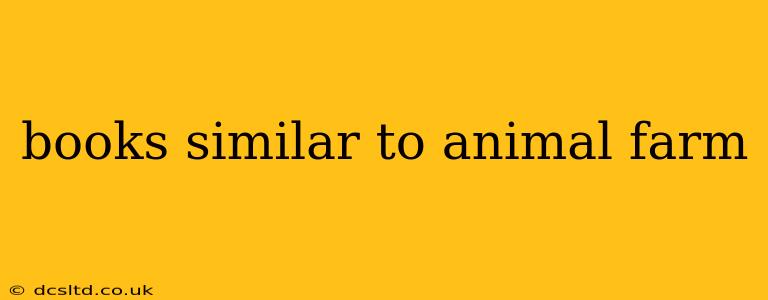George Orwell's Animal Farm remains a chillingly relevant allegory, exploring the dangers of totalitarianism and the corruption of power. Its impact stems from its deceptively simple prose and the universality of its themes. If you're searching for books that evoke similar feelings of unease, intellectual stimulation, and profound social commentary, you've come to the right place. This article will delve into several compelling reads, examining their shared characteristics and highlighting what makes each unique.
What Makes Animal Farm Unique?
Before diving into recommendations, it's crucial to understand what resonates so deeply with readers in Animal Farm. The novel masterfully blends:
- Satire: Orwell uses animals as a thinly veiled metaphor for the Russian Revolution and the rise of Stalinism. This satirical approach makes the grim realities of oppression accessible and thought-provoking.
- Allegory: The story functions on multiple levels, allowing readers to interpret the events through the lens of historical events or as a timeless cautionary tale about power dynamics.
- Political Commentary: The book serves as a potent critique of political systems, highlighting the dangers of unchecked power, propaganda, and the manipulation of the masses.
- Suspense and Intrigue: Despite its allegorical nature, Animal Farm maintains a captivating narrative, keeping readers engaged with the unfolding drama on the farm.
Books Similar to Animal Farm: Exploring Shared Themes
Now, let's explore some books that share these key elements with Animal Farm:
1. Nineteen Eighty-Four (George Orwell)
It would be remiss not to mention Orwell's other masterpiece, Nineteen Eighty-Four. This dystopian novel delves even deeper into the mechanics of totalitarian control, exploring themes of surveillance, thought control, and the manipulation of language. While differing in setting and specifics, both novels share Orwell's sharp wit, profound social commentary, and chilling vision of a future dominated by oppressive regimes.
2. Lord of the Flies (William Golding)
This classic explores the inherent savagery and darkness within humanity, set against the backdrop of a group of British schoolboys stranded on a deserted island. While not directly about political systems, Lord of the Flies examines the fragility of civilization and the ease with which order can collapse into chaos, mirroring the breakdown of societal structures depicted in Animal Farm.
3. The Handmaid's Tale (Margaret Atwood)
Set in the dystopian Republic of Gilead, this novel portrays a totalitarian theocracy that strips women of their rights and reduces them to reproductive vessels. Similar to Animal Farm, Atwood uses a powerful allegory to critique oppressive systems and warn against the dangers of religious extremism and social control. The themes of propaganda and the manipulation of language are also strongly present.
4. Animal Liberation (Peter Singer)
While not a work of fiction, Peter Singer's seminal work on animal rights provides a philosophical framework that resonates with the themes of exploitation and oppression found in Animal Farm. Singer’s arguments expose the ethical inconsistencies of human treatment of animals, encouraging readers to examine their own complicity in systems of oppression, similar to the way Animal Farm prompts readers to examine political systems.
5. The Trial (Franz Kafka)
This existential novel explores themes of alienation, bureaucracy, and the absurdity of justice within a totalitarian system. While not directly mirroring the political aspects of Animal Farm, Kafka's masterpiece shares a similar sense of unease, powerlessness, and the overwhelming nature of oppressive forces.
What are the similarities between Animal Farm and other dystopian novels?
Many dystopian novels share common threads with Animal Farm, including:
- Oppressive regimes: Most dystopian fiction depicts societies ruled by authoritarian governments that suppress individual freedoms and dissent.
- Propaganda and manipulation: The control of information and the manipulation of public opinion are key tools employed by oppressive regimes in both Animal Farm and other dystopian novels.
- Loss of individuality: The dehumanization and suppression of individuality are recurring themes that emphasize the dangers of conformity and the erosion of personal autonomy.
By exploring these works, readers can gain a deeper understanding of the enduring themes present in Animal Farm and the continued relevance of its warnings in the modern world. Each book offers a unique perspective on power, corruption, and the struggle for freedom, enriching the reader's appreciation of this classic allegory.
